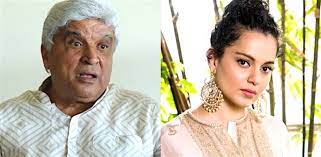The Bombay high court today (February 2) dismissed a plea by Kangana Ranaut seeking a stay on the criminal defamation case filed against her by writer-lyricist Javed Akhtar in 2020. It also dismissed her plea to club the case with her cross-complaint filed subsequently.
Justice Prakash Naik ruled that the proceedings could neither be stayed nor clubbed as the actress had never contended that the two cases were cross-cases. He also held that notwithstanding the absence of Kangana’s contention, Akhtar’s complaint had been filed first.
The defamation case of Javed against Kangana is going on before the Andheri metropolitan magistrate court in Bombay. Kangana’s complaint against Javed Akhtar was stayed by the sessions court in Bombay.
In her writ petition, the actress stated that both the cases had their genesis in a meeting held in 2016 and hence should be tried together. Javed strongly opposed her petition and called it yet another attempt to delay the defamation case. He pointed out that Ranaut had filed nine different legal challenges or petitions before various courts, all of which had been dismissed. He added that after those dismissals, she filed a counter-complaint containing false, fabricated and invented allegations.
Javed Akhtar’s plea, filed on November 3, 2020, was that Kangana defamed and damaged his immaculate reputation by dragging his name into actor Sushant Singh Rajput’s death, in her interview with Republic TV anchor Arnab Goswami on July 19, 2020. She is currently facing trial under IPC sections 499 and 500 in the case.
In 2021, Kangana Ranaut hit back by filing a counter-complaint against Javed Akhtar in the same Bombay court, alleging criminal intimidation and insult to modesty under IPC sections 506 and 509, based on a meeting held in 2016. The actress alleged that in the 2016 meeting, Javed criminally intimidated her and demanded that she apologise to Hrithik Roshan.
Akhtar challenged this in the sessions court which stayed proceedings in Kangana’s complaint until the disposal of his revision petition.
In the present case, Akhtar’s lawyer, Jay Bharadwaj, argued that the petition was not maintainable. He also stated that Ranaut’s entire case was based on the assumption and probability of getting a favourable outcome in the pending litigation, and this could not be a ground for invoking a writ jurisdiction and seeing a stay on lower court proceedings.





























